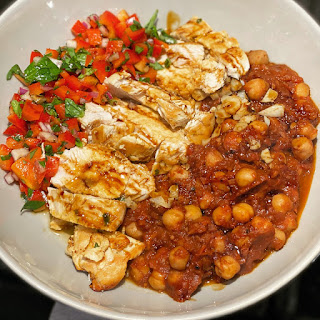Amazing Ale Bread
Nothing beats the smell of freshly baked bread wafting through the house and when the recipe is as simple as this one, there's really no excuse not to!
I recently picked up a packet of fresh yeast from my local supermarket and as a result I've been experimenting with different kinds of bread. This particular loaf has a lovely thick crust complimenting its soft, light interior. This is what I would call an 'everyday' bread and its best served simply with a generous helping of butter alongside your favourite soup.
Amazing Ale Bread
250g strong white bread flour, plus extra to dust
250g wholemeal bread flour
10g fine sea salt
1 tsp chopped fresh thyme leaves
½ tsp ground fennel seeds
15g fresh yeast (or 7g dried fast-action yeast)
10g golden caster sugar
280ml best bitter of your choice, warmed to blood temperature
1 tbsp olive oil, plus extra
In a large mixing bowl, combine the white and wholemeal flours, salt, thyme and ground fennel, then make a well in the middle.
In a separate bowl, dissolve the yeast and sugar in the warmed ale, then whisk in the oil. Quickly pour the wet ingredients over the dry and mix with a wooden spoon to form a sticky dough. If you have a stand mixer, attach the dough hook and knead for 8-10 minutes on a medium speed until the dough springs back to the touch and the texture is smooth. (Otherwise knead the bread on a lightly floured surface for about 10 minutes until it springs back to the touch.) Put the dough in a large, lightly oiled bowl and cover with cling film. Leave in a warm place for at least 1 hour until doubled in size.
When the dough has risen, lightly flour your hands, then knock back and knead the dough for about 1 minute. Shape into a lozenge/rectangle, transfer to a lightly floured non-stick baking sheet and cover loosely with oiled cling film. Leave to prove for 30 minutes until risen a little and a small indentation remains when touched with your finger. In the meantime, preheat the oven to 200°C/180°C fan/gas 6.
Dust the proved loaf generously with flour, then gently score slashes into the top using a very sharp knife (the slashes will allow the loaf to expand without breaking the crust). Pour a glass of water into a roasting tray at the bottom of the oven, then bake the loaf in the centre of the oven for 40 minutes.
Remove the bread from the oven and check it’s cooked through by tapping on the base of the loaf – when it’s cooked, it will sound hollow. Transfer to a wire rack to cool and then serve.
I recently picked up a packet of fresh yeast from my local supermarket and as a result I've been experimenting with different kinds of bread. This particular loaf has a lovely thick crust complimenting its soft, light interior. This is what I would call an 'everyday' bread and its best served simply with a generous helping of butter alongside your favourite soup.
Amazing Ale Bread
250g strong white bread flour, plus extra to dust
250g wholemeal bread flour
10g fine sea salt
1 tsp chopped fresh thyme leaves
½ tsp ground fennel seeds
15g fresh yeast (or 7g dried fast-action yeast)
10g golden caster sugar
280ml best bitter of your choice, warmed to blood temperature
1 tbsp olive oil, plus extra
In a large mixing bowl, combine the white and wholemeal flours, salt, thyme and ground fennel, then make a well in the middle.
In a separate bowl, dissolve the yeast and sugar in the warmed ale, then whisk in the oil. Quickly pour the wet ingredients over the dry and mix with a wooden spoon to form a sticky dough. If you have a stand mixer, attach the dough hook and knead for 8-10 minutes on a medium speed until the dough springs back to the touch and the texture is smooth. (Otherwise knead the bread on a lightly floured surface for about 10 minutes until it springs back to the touch.) Put the dough in a large, lightly oiled bowl and cover with cling film. Leave in a warm place for at least 1 hour until doubled in size.
When the dough has risen, lightly flour your hands, then knock back and knead the dough for about 1 minute. Shape into a lozenge/rectangle, transfer to a lightly floured non-stick baking sheet and cover loosely with oiled cling film. Leave to prove for 30 minutes until risen a little and a small indentation remains when touched with your finger. In the meantime, preheat the oven to 200°C/180°C fan/gas 6.
Dust the proved loaf generously with flour, then gently score slashes into the top using a very sharp knife (the slashes will allow the loaf to expand without breaking the crust). Pour a glass of water into a roasting tray at the bottom of the oven, then bake the loaf in the centre of the oven for 40 minutes.
Remove the bread from the oven and check it’s cooked through by tapping on the base of the loaf – when it’s cooked, it will sound hollow. Transfer to a wire rack to cool and then serve.



Comments
Post a Comment